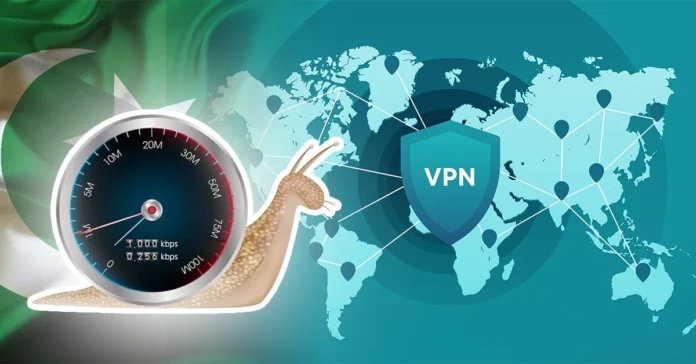VPNs Blamed!! Shaza Fatima Khawaja, the Federal Minister of State for Information Technology, recently spoke about the issues with slow internet service in Pakistan. She addressed the public’s concerns regarding this matter.
In a news conference held in Islamabad today, she firmly denied any government involvement in intentionally slowing down or blocking the internet. Instead, she pointed to the excessive use of Virtual Private Networks (VPNs) as the primary cause behind the sluggish internet speeds.
Table of Contents
The Current Slowdown in Internet Service
Shaza Khawaja explained that as certain applications and services were restricted, many users turned to VPNs to bypass these limitations. However, this widespread reliance on VPNs has unintentionally led to a significant slowdown in internet services, particularly affecting mobile data speeds.
The minister emphasized that VPNs, while useful for accessing restricted content, add layers of encryption that overload the network, causing delays and interruptions for all users. Despite public frustration, Shaza Fatima assured citizens that the government is actively working on solutions to improve internet services across the country.
She mentioned that the government is establishing a Digitization Commission aimed at accelerating the digitization of Pakistan’s economy. Additionally, she highlighted that IT exports have shown a positive trend, thanks to the measures implemented by the Special Investment Facilitation Council.
READ ALSO: Pakistan’s Internet Firewall: $300M Economic Disaster Sparks Global Exit
In response to rumors about the government deliberately slowing down the internet, the minister firmly rejected these claims. She reiterated that the issues stem from the overuse of VPNs, not from any shortcomings or intentional actions by the government.
Major IT Initiatives Announced
Shaza Fatima shared some major developments on the country’s digital front. Speaking at a press conference in Islamabad, she revealed that the government is set to introduce 5G spectrum in Pakistan by 2025. “5G will provide the fastest internet,” Khawaja assured, highlighting the government’s commitment to advancing the nation’s digital infrastructure.
The minister also announced that foundation stones have been laid for IT Parks in Islamabad and Karachi, which are expected to generate over 10,000 jobs and bring in millions of dollars in revenue. These IT Parks are being developed with the assistance of South Korea, marking a significant step towards boosting the country’s tech industry.
In addition to these initiatives, Khawaja revealed plans to establish at least 250 e-employment centers across the country in collaboration with provincial governments. These centers aim to provide digital job opportunities, further enhancing Pakistan’s IT landscape.
Despite the challenging economic conditions, Prime Minister Shehbaz Sharif has allocated more than Rs 60 billion for the IT sector in the national budget, emphasizing its importance.
The minister praised the sector’s achievements, noting that IT exports have reached Rs 3 billion. She also mentioned that the digitization commission, which will be chaired by the Prime Minister himself, is being established to spearhead the country’s digital transformation.
After highlighting these significant initiatives, Khawaja turned to the ongoing issue of slow internet speeds. She firmly denied any government involvement in intentionally slowing down or blocking the internet, attributing the issue to the excessive use of Virtual Private Networks (VPNs) instead.
How VPNs Slow Down Internet Service
VPNs work by routing your internet connection through an encrypted tunnel to a server, often in a different geographic location. This process adds layers of encryption and distance to your data’s journey, which can significantly increase latency and reduce speed. In Pakistan, where internet infrastructure is already under pressure, the added load from widespread VPN usage can lead to noticeable slowdowns.
READ ALSO: 7 Devastating Consequences of Internet Disruptions in Pakistan: Why Action Is Urgently Needed


